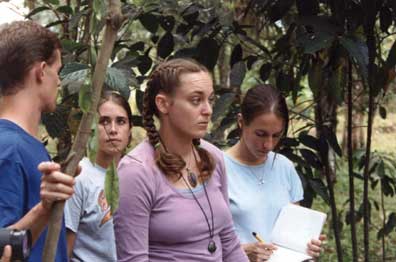
Roadside robbery leaves victim angry
Roadside robbery leaves victim angry
Volunteer fears community she was trying to rebuild
By Russell Carollo
Dayton Daily News
SAN SALVADOR, El Salvador | Tracy Poling of Brooklyn, Ohio, ended her Peace Corps career when she decided to take a walk while waiting for a bus along the main road in the village of San Cayetano.
"Two men came out of the bushes, and they had guns," said Poling, who was 25 then. "I threw my stuff on the ground, and I just kept taking a step back."
The men took her backpack and wristwatch but did not harm the Peace Corps volunteer. Still, the August 2001 robbery left Poling angry toward the people of El Salvador, people she had come there to help.
"I refused to shake hands with anybody," she said. "These feelings just kept going on and on."
Poling, who grew up in the Cleveland area, joined the Peace Corps after graduating from the University of Akron in December 1999 with a bachelor's degree in Spanish and international business. While in college, she studied in Mexico, and before joining the Peace Corps, she lived in Costa Rica for a couple of months.
She arrived in El Salvador in January 2001, and before she finished her three months of training, a major earthquake struck, destroying many homes. She was originally assigned a job in water sanitation but worked instead to help rebuild after the earthquake.
Because the earthquake damaged much of the housing at her assigned site, San Cayetano, Poling had to live in San Vicente, near the Peace Corps training center, and commute to her site by bus 10 to 15 minutes each way.
On the day she was robbed, Poling had left San Cayetano and walked to the main road to catch a bus back to San Vicente. There are no designated bus stops, so she decided to walk as she waited for the bus to pass.
Reminders of the dangers are everywhere here. Heavily armed guards stand in front of many businesses, including gas stations. Men with shotguns stand in front of the World Gym in downtown San Salvador, and razor wire seems to be everywhere, especially on rooftops.
Across the country but especially in the countryside men carry machetes, even one well-dressed man who carried his in a beautiful leather case along with his briefcase in downtown San Salvador.
El Salvador ranks 12th among 102 countries worldwide in the number of assault cases involving Peace Corps volunteers since 1990.
Between 1995 and 2003, at least 57 assaults against volunteers were reported in El Salvador, and 35 of those were classified as aggravated assaults. During the same period, at least 10 volunteers reported robberies.
"It's scary as a parent to sit here and know your kid is sitting over there and you don't know what they're going into," said Leslie Poling, Tracy's mother. "It's not a safe country to be in for these people. A lot of it is that they're totally on their own."
Poling thinks she might not have been robbed if the Peace Corps had stationed someone else at her site with her, and she thinks volunteers should be stationed in pairs in dangerous areas.
"Yes, I would have felt safe if there was someone else there," she said.
Like many volunteers who become crime victims, Poling said, she was sent to Washington, D.C., for counseling. There, she said, a female counselor led her to believe she could eventually return to El Salvador.
"I said I do want to return to El Salvador. I do want to go back, and I do want to finish my service," Poling recalled. "And she said, No. That's not a healthy choice. You don't sound like you're making a healthy decision.
"And so she separated me (from Peace Corps). She said because I wasn't excited about it (returning to El Salvador), that it wasn't a good idea. . . . I was shocked. I was just shocked because I thought it was my decision to make."
Mike Wise, the Peace Corps country director in El Salvador, called Poling "one of our stars" because she was one of only two volunteers in her group to request an assignment in an earthquake-affected area, even though she could have chosen to go elsewhere.
Wise said he had no part in the decision to prevent Poling from returning to El Salvador.
"For our part, I know we wanted her back posthaste," Wise said.
Poling said the Peace Corps offered to pack her things in El Salvador and send them back to her, but she decided to return on her own.
"I needed closure," said Poling, now working as an emergency medical technician in the Cleveland area. "I needed to go say goodbye to my community."
[From the Dayton Daily News: 10.27.2003]
